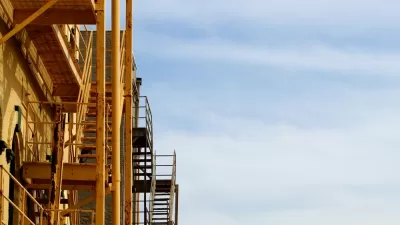A new series of articles, launched by a big feature earlier this month, will explore the changes occurring in the famous and beloved city of Nashville.

"Nashville is growing and changing fast, and the nation has taken notice," writes David Plazas in a large, photo supplemented feature for The Tennessean.
Plazas endeavors to describe the flip side of the city's rapid growth, summarized thusly: "for people who can no longer afford to live in Nashville because of the hot real estate market, the 'it city' dream is elusive."
Data backs the narrative described from multiple angles in the article:
The census reported that from 2011 to 2015, the average home price in the Nashville area was $167,500. That jumped to $266,408 in December 2016, according to monthly data tracked by the Greater Nashville Realtors.
Real Estate website Zillow even named Nashville the hottest real estate market in 2017.
Meanwhile African-American neighborhoods near downtown undergoing a wave of displacement and "[a]ffordable housing for lower-income families is now in the suburbs, in places such as Antioch, Bellevue and Madison," writes Plazas. "In some cases, that is causing a concentration of poverty in outlying areas of the city."
Rev. Bill Barnes, whose name is also found on city's affordable housing trust fund, is quoted in the article describing the "suburbanization of poverty" and the "homogenization" of neighborhoods, "where poorer children have inequitable access to quality schools, transportation and opportunities."
Plazas also discussed the affordable housing agenda laid out in the 2015 NashvilleNext comprehensive plan. For more on the community engagement process that led to the approval of that plan, read a Planetizen feature from August 2014.
The feature article by Plazas is the first in a monthly series on "growth, housing, displacement and the future of Nashville’s neighborhoods."
FULL STORY: The costs of growth and change in Nashville

Alabama: Trump Terminates Settlements for Black Communities Harmed By Raw Sewage
Trump deemed the landmark civil rights agreement “illegal DEI and environmental justice policy.”

Study: Maui’s Plan to Convert Vacation Rentals to Long-Term Housing Could Cause Nearly $1 Billion Economic Loss
The plan would reduce visitor accommodation by 25% resulting in 1,900 jobs lost.

Planetizen Federal Action Tracker
A weekly monitor of how Trump’s orders and actions are impacting planners and planning in America.

Wind Energy on the Rise Despite Federal Policy Reversal
The Trump administration is revoking federal support for renewable energy, but demand for new projects continues unabated.

Passengers Flock to Caltrain After Electrification
The new electric trains are running faster and more reliably, leading to strong ridership growth on the Bay Area rail system.

Texas Churches Rally Behind ‘Yes in God’s Back Yard’ Legislation
Religious leaders want the state to reduce zoning regulations to streamline leasing church-owned land to housing developers.
Urban Design for Planners 1: Software Tools
This six-course series explores essential urban design concepts using open source software and equips planners with the tools they need to participate fully in the urban design process.
Planning for Universal Design
Learn the tools for implementing Universal Design in planning regulations.
Caltrans
Smith Gee Studio
Institute for Housing and Urban Development Studies (IHS)
City of Grandview
Harvard GSD Executive Education
Toledo-Lucas County Plan Commissions
Salt Lake City
NYU Wagner Graduate School of Public Service





























